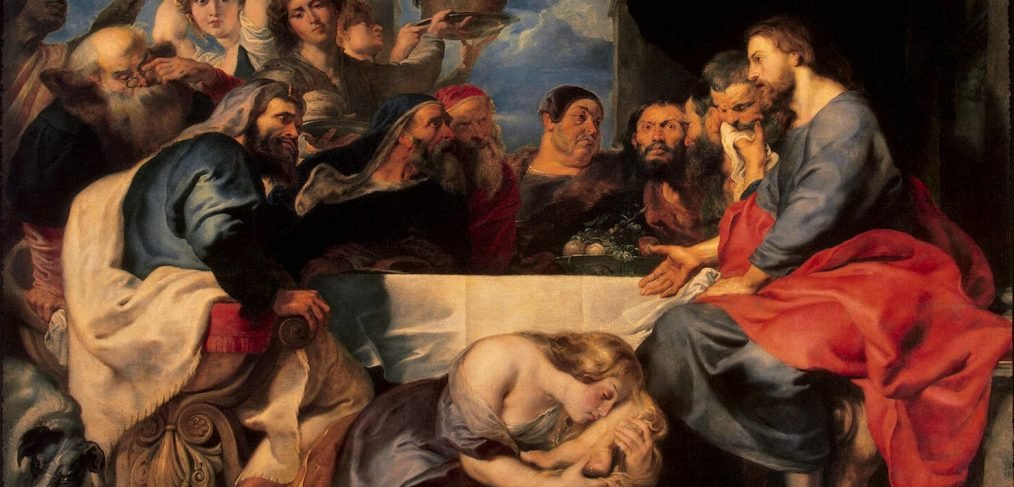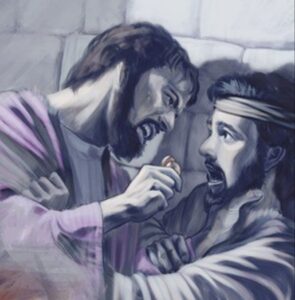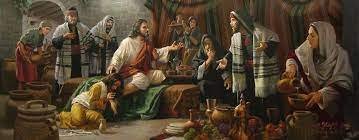The Parable of the Two Debtors is a teaching given by Jesus to all his disciples, to show them how important it was to forgive with all your heart and have mercy on your fellow man since many of them still had residues of lack of faith in their hearts. sorry.
That is why Jesus speaks not only to the disciples but to all humanity, so that they see with compassion, mercy, kindness the people around them, and forgive with all their heart since by not doing so they could not have that forgiveness from Heavenly Father.
- Parable of the Lost sheep meaning and scripture reference
- Parable of the Talents and their True Biblical Meaning
- What does Selah mean in the Bible and why is it important
Parable of the two debtors

This parable arises as a substantial response to what Jesus replied to Peter, who asked him how many times he should forgive the person who did him any harm, before that He replied that he should do it up to seven times seven.
Lord, how many times will I forgive my brother for sinning against me? Up to seven? I do not tell you up to seven, but even up to seventy times seven “(Matthew 18: 21-22)
These are urgent because Pedro was a person who did not have patience and was temperamental in the face of situations that could happen around him. That is why Jesus wisely took this moment to tell a story where they reflect the value of knowing how to forgive, and the mercy that a person who wants to receive God’s forgiveness must have. And that is why he narrated the following parable:
“For this reason, the kingdom of heaven is like a king who wanted to settle accounts with his servants. And beginning to do the math, he was presented with one who owed him ten thousand talents. As he could not pay, his master ordered him to sell him, his wife and children, and everything he had, so that the debt could be paid.
Then that servant, prostrate, begged him, saying: Lord, bear with me, and I will pay you everything. The lord of that servant moved with mercy, released him, and forgave him the debt. But when that servant went out, he found one of his fellow servants, who owed him a hundred denarii; and seizing him, he choked him, saying: Pay me what you owe me.
Then his fellow servant, falling down at his feet, begged him saying: Be patient with me, and I will pay you everything. But he would not, but went and threw him in jail, until he paid the debt. When his fellow servants saw what was happening, they were very sad, and they went and told their master about everything that had happened.
Then, calling him his lord, he said to him: Evil servant, I forgave you all that debt, because you begged me. Shouldn’t you also have mercy on your fellow servant, as I had mercy on you? Then his lord, angry, handed him over to the executioners until he paid all that he owed him. So will my heavenly Father do to you if you do not forgive each his brother his trespasses with all your heart “(Matthew 18: 23-35)
ALSO READ:
- The Parable Of The Lost Coin Meaning And Explanation
- The Parable of the Sower Meaning and Explanation
- Parable of the rich fool Meaning; Luke 12:13
Symbology of the Parable of the Two Debtors
From this parable several things emerge that are pertinent to detail, below we present each one of them:
God is the king
In the spiritual aspect, the king who speaks the parable is God himself, who has all the power and economic prosperity without measure, and that negligent servant is the people who irresponsibly sin before God every day, becoming those debtors.
A big debt
The parable begins by speaking that a king began to take accounts of the loans that he had to his servants, and one was found that owed him ten thousand talents, notice something here at that time a talent represented between 25 and 30 kilos of value, and They barely earned a denarius a day for their work, this means that it would take many years for them to pay off that debt.
Given this, a valid question arises, how could this servant accumulate such a large debt? It can be said that it did not give importance in time, so that it accumulated for many years, to the point that it reached that amount that was impossible to pay.
However, this parable does not refer to earthly debts that many times people can pay, Jesus is referring to the debt of the soul, which is priceless. And that is why Jesus narrates this teaching, warning everyone about how the soul cannot pay even if they have all the money in the world.
“Because what will profit a man, if he wins the whole world, and loses his soul? Or what reward will a man give for his soul? ” (Matthew 16:26)
Jesus wanted to show that humanity had a debt impossible to pay to God, and it is only through Him that it could be settled, through the sacrifice on the cross, where that debt could be paid, paying everything in favor of the debtors: The humanity.
A Debtor Person
This debtor was a servant of the king, who accumulated debt as a result of his irresponsibility and disinterest, since he did not give importance to the king, until the moment he called him to collect the accumulated debt.
In the same way, it happened with humanity that was submerged in sin, to such an extent that the apostle Paul describes the daily struggle of the believer in God.
“Because what I do, I don’t understand; for I do not do what I want, but what I hate, I do. And if what I do not want, this I do, I approve that the law is good. So it is no longer I who does that, but the sin that dwells in me. And I know that in me, that is, in my flesh, good does not dwell; because wanting the good is in me, but not doing it. Because I do not do the good that I want, but the evil that I do not want, that is what I do. And if I do what I do not want, I no longer do it, but the sin that dwells in me. So when I want to do good, I find this law: that evil is in me “(Romans 7: 15-21)
This describes that only through Jesus can people have freedom, which is the way not to let themselves be dominated by sin, it is evident that human beings live in a struggle as Paul says “what I don’t want to do that I do ” that makes everyone become debtors, but they have been redeemed by Jesus.
The Form of Debt Payment
This king was very impatient in the payment of the debt, to the point that he gave him an order so that he could cancel it as soon as possible and it was the following:
“To this, as he could not pay, his master ordered to sell him, his wife and children, and everything he had, so that the debt could be paid”
It could be said that it was a harsh punishment since they would be sold as slaves to him and his family, but it was not that cruel, since he could send him to the stake or behead him, and he still had mercy in leaving him alive. Before that, this man asked for time to pay it, something that the king knew was impossible.
The Servant received the King’s Forgiveness
The parable continues narrating that the servant felt cornered, so he prostrated himself before the king and began to plead, explaining that he did not have the means to cancel the debt and that he had mercy on his life, that he did not sell it, to be patient with him.
“Lord, bear with me, and I will pay you everything.”
This servant insisted before the king, showing reverence before him, a situation that moved the heart of the king who forgave him the debt he owed him.
“The lord of that servant, moved with mercy, released him and forgave him the debt”
This situation shows that salvation is impossible to pay, and can only be obtained by being at the feet of the Lord, who through his bloodshed on the cross of Calvary, can be saved by fulfilling the word of God that says what it is impossible for man for God it is possible.
The Servant’s Lack of Forgiveness Represented by the King

After receiving forgiveness from the king, this servant got himself with a fellow servant, who owed him a few denarii, demanded the payment of the debt, forgetting the kindness and forgiveness received from the king.
“But that servant going out, found one of his fellow servants, who owed him a hundred denarii; and seizing him, he choked him, saying: Pay me what you owe me. “
This debt was small compared to the debt he owed to the king, and he did not act with mercy as they did with him but acted harshly and wickedly at the plea of this man who begged him to give him more time to pay him. Debt.
“Then his fellow servant, falling down at his feet, begged him saying: Be patient with me, and I will pay you everything. But he would not, but went and threw him in jail, until he paid the debt. Seeing his fellow servants what was happening, they were very saddened “
This situation caused everyone in the kingdom to know the wrongdoing of this servant, who did not act in the correct way, so the king sent for him and said the following:
“Evil servant, all that debt I forgave you because you begged me. Shouldn’t you also have mercy on your fellow servant, as I had mercy on you? “
You can see how this man quickly forgot the forgiveness he had received from the king, and that happens on many occasions to believers, who do not forgive what they have lacked but rather hold a grudge against them , turning away from mercy. with which God has forgiven him.
CHECKOUT:
- Short prayer for healing and recovery
- Opening prayer for a meeting and Bible study
- Ephesians 3:20 meaning
Importance of Forgiveness
This parable ends with a call to mercy and forgiveness, asserting that everyone must have a forgiving heart, this means that they must always be willing to forgive those who offend them because in the same way they would receive God’s forgiveness.
“So also my heavenly Father will do to you if you do not forgive each his brother his trespasses with all your heart”
In that sense, the king of the parable, upset by the lack of mercy of this servant, handed him over to the executioners, until he paid everything he owed, this refers to the most severe punishment that a person can receive and is the punishment of an eternity of pain and suffering in hell.
That is why the teaching seeks to learn to forgive in the same way that Heavenly Father does. It is acting with kindness, meekness, mercy and doing it with all your heart, it is not only forgiving, but it is also doing it in a genuine way because when you do not forgive yourself in a clean way, roots of bitterness begin to germinate that lead to the condemnation of the soul.
Conclusion:
Finally, it can be said that the parable of the two debtors is the sample of a genuine forgiveness on the part of God towards humanity, but it is also the teaching that all those who are forgiven must show love and mercy to their fellow men to whom they owe. forgive for any harm, in the same way, that God does on a daily basis.

